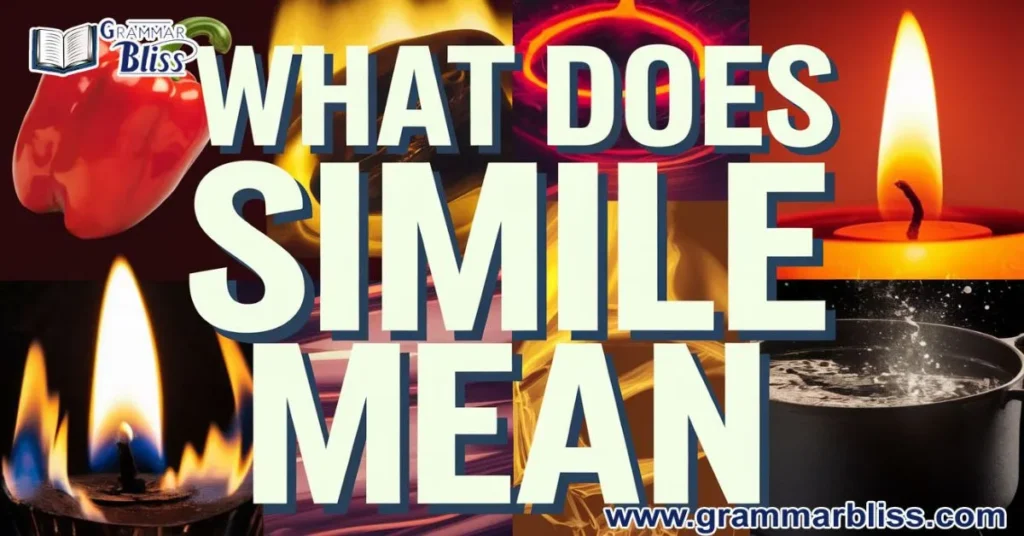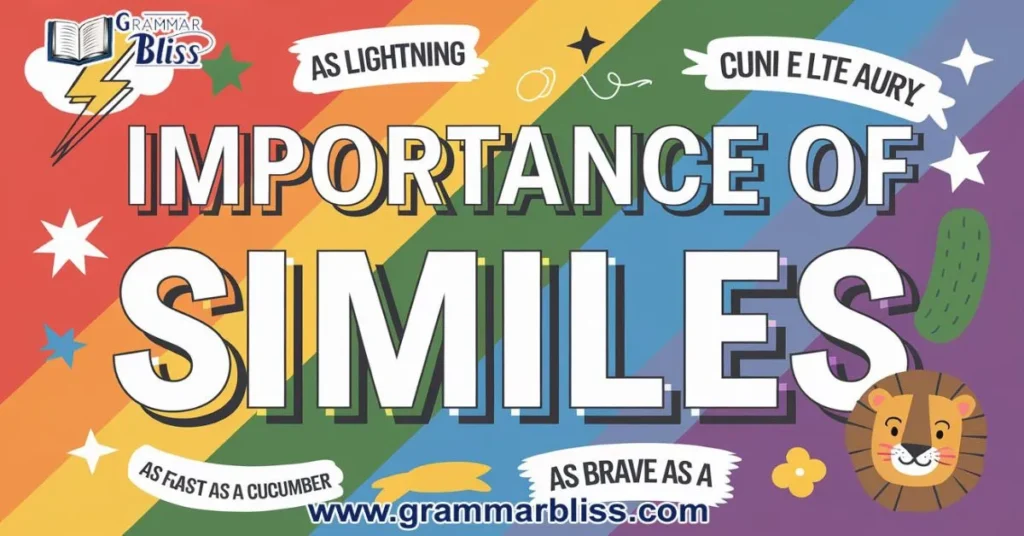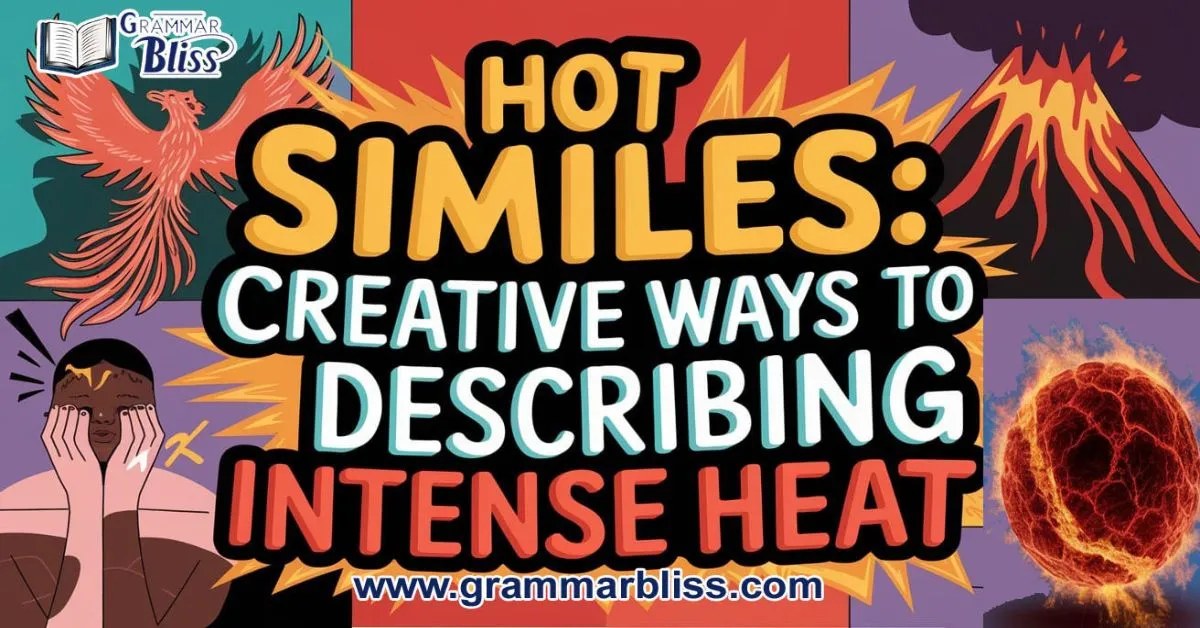Hot Similes are a creative way to describe intense heat, fire, and passion, making descriptions more vivid and engaging. By using comparisons like “hot as a stove top” or “blazing like a rocket engine,” hot similes instantly convey powerful imagery that evokes strong sensory responses.
Whether you’re describing the scorching sun on a summer day or the searing intensity of a volcano, these expressions help your audience feel the heat and intensity you’re trying to portray. In this guide, we’ll explore various hot similes and how they can enhance your writing, from fiery descriptions to scorching imagery, making your language more dynamic and impactful.
Read: in-conclusion-understanding-its-meaning-usage-and-alternatives/
Quick Summary
Similes are a great way to describe heat in ways that are relatable and vivid. For example, you could say something is hot as a sauna or blazing like a rocket engine. Using these types of comparisons makes the writing more interesting and engaging. In this post, we will explain what a simile is, its importance in writing, and how to use it effectively to describe intense heat. We’ll also take a look at some hot similes that you can use in your own writing.
What Does Simile Mean?

A simile is a figure of speech used to compare two things using the words “like” or “as.” It makes a description clearer and more vivid by showing the similarities between things that might not seem similar at first. For example, saying something is “as hot as a stovetop” helps the reader immediately understand just how intense the heat is.
Similes are different from metaphors. While a metaphor directly says something is something else (like “the world is a stage”), a simile compares two things using “like” or “as” (for example, “her temper was as fiery as a dragon’s breath“). This makes similes a very useful tool for writers because they help create vivid images in the reader’s mind.
Importance of Similes

Similes are important because they help us understand and feel things more deeply. Describing heat as “scorching like a preheated oven” or “radiating like molten lava” gives readers a more tangible understanding of what the writer is trying to say. Instead of simply saying something is hot, the writer creates an image that engages the reader’s senses.
Similes also help create an emotional connection. For example, describing the heat of the sun as “blazing like a wildfire” can make the reader feel the intensity and discomfort of a hot day. This emotional impact is what makes similes such a powerful tool in writing.
Advantages or Disadvantages of Using Similes
Advantages of Using Similes
- Creates Vivid Imagery
Similes make descriptions more colorful and help readers visualize concepts better. - Enhances Understanding
They simplify complex or abstract ideas by comparing them to familiar objects or experiences. - Engages Emotions
Similes can trigger emotional responses, helping readers connect more deeply with the content. - Makes Writing More Creative
By using similes, writers can add personality and originality to their writing. - Improves Clarity
Comparing something to a well-known object or situation can clarify meaning and make it easier to understand.
Disadvantages of Using Similes
- Overuse Can Lead to Clichés
Frequent use of overused similes (like “as busy as a bee”) can make writing feel repetitive or stale. - May Be Confusing
If the comparison is too obscure or hard to relate to, it can confuse readers rather than helping them. - Can Distract from the Main Message
Over-elaborate similes might divert attention from the core idea of the writing. - Requires Context to Be Effective
Without the proper context, similes may feel forced or awkward and lose their impact. - Might Complicate Simple Ideas
In some cases, similes can add unnecessary complexity to simple points, making them harder to follow.
Learn: ballon-or-balloon-the-correct-spelling/
Creative Hot Similes for Every Occasion
Now let’s look at some hot similes that you can use to describe different levels of heat. These examples will show you how to get creative with your comparisons.
1. Scorching like a preheated oven
Meaning: Extremely hot, similar to the heat of an oven that has been preheated to a high temperature.
Example: The sand felt scorching like a preheated oven under my bare feet.
2. Blazing like a roaring flame
Meaning: Very intense and powerful, like the fierce flames of a fire.
Example: The campfire burned blazing like a roaring flame, lighting up the night.
3. Scorching like midday sunlight
Meaning: Extremely hot, comparable to the intense heat of the sun at noon.
Example: The heat was scorching like midday sunlight, making it impossible to stay outside for long.
4. Intense like a sizzling burner
Meaning: A strong and concentrated heat, like the heat coming from a stovetop burner.
Example: The stove was intense like a sizzling burner, sending waves of heat through the kitchen.
5. Fiery like an erupting volcano
Meaning: Extremely hot and violent, much like the molten lava from an erupting volcano.
Example: The argument became fiery like an erupting volcano, with both sides shouting at each other.
6. Steamy like a traditional sauna
Meaning: Hot and humid, similar to the intense heat and moisture inside a sauna.
Example: The bathroom was steamy like a traditional sauna after the long hot shower.
7. Boiling like the inside of a furnace
Meaning: Extremely hot, like the interior of a furnace where metals are melted.
Example: The air felt boiling like the inside of a furnace on that hot summer day.
8. Piping hot like a frying pan
Meaning: Very hot, similar to the temperature of a frying pan just taken off the stove.
Example: The coffee was piping hot like a frying pan, almost too hot to drink.
9. Sweltering like a desert midday
Meaning: Overwhelmingly hot, much like the intense heat of a desert at noon.
Example: The day was sweltering like a desert midday, with no breeze to offer relief.
10. Glowing like a smoldering coal
Meaning: A soft but consistent heat, similar to the glowing embers of a dying fire.
Example: The campfire was glowing like a smoldering coal, casting a warm, red light.
11. Rapidly heated like a microwave meal
Meaning: Quickly and evenly heated, similar to how a microwave rapidly heats food.
Example: The water in the kettle became rapidly heated like a microwave meal, ready for tea in seconds.
12. Scalding like liquid metal
Meaning: Extremely hot, like the molten metal found in industrial smelting.
Example: The metal was scalding like liquid metal, burning everything in its path.
13. Cozy like a crackling campfire
Meaning: Comfortably warm, like the pleasant heat of a campfire.
Example: The blanket felt cozy like a crackling campfire on a cold winter night.
14. Blazing like a rocket’s thrust
Meaning: Intense, fiery, and powerful, much like the propulsion of a rocket’s engine.
Example: The explosion was blazing like a rocket’s thrust, lighting up the entire sky.
15. Spicy like a fiery chili
Meaning: Hot and burning, similar to the intense heat of a chili pepper.
Example: The sauce was spicy like a fiery chili, making my mouth burn with every bite.
16. Scorching like flowing lava
Meaning: Extremely hot, like the molten lava from a volcanic eruption.
Example: The floor felt scorching like flowing lava, making me jump to avoid the burn.
17. Steaming like an old locomotive
Meaning: Hot and emitting steam, like the exhaust of a steam engine.
Example: The car was steaming like an old locomotive, its engine overheating under the summer sun.
18. Intense like a pressurized cooker
Meaning: High pressure and heat, much like the inside of a pressure cooker.
Example: The argument was intense like a pressurized cooker, ready to blow at any moment.
19. Boiling like a frying pan
Meaning: Very hot, similar to the heat of a frying pan over high heat.
Example: The oil was boiling like a frying pan, sizzling with the meat inside.
20. Radiating like a molten furnace
Meaning: Emitting extreme heat, like the heat radiating from a furnace full of molten metal.
Example: The oven door was radiating like a molten furnace, too hot to touch.
21. Warm like a heated spa towel
Meaning: Comfortably warm, similar to the heat of a towel fresh from a spa treatment.
Example: The towel felt warm like a heated spa towel, soothing my cold skin.
22. Fresh like a just-baked cake
Meaning: Warm and inviting, much like a cake straight out of the oven.
Example: The bread was fresh like a just-baked cake, warm and fragrant.
23. Torrid like an August afternoon
Meaning: Very hot, like the extreme heat of a summer afternoon.
Example: The heat was torrid like an August afternoon, making it hard to even move outside.
24. Scalding like a dragon’s breath
Meaning: Extremely hot and intense, much like the fiery breath of a mythical dragon.
Example: The air was scalding like a dragon’s breath, making it feel like I was walking through flames.
25. Smoldering like a dying ember
Meaning: A slow, persistent heat, like the last embers of a fire.
Example: His anger was smoldering like a dying ember, still burning deep inside despite his calm exterior.
26. Undulating like a lava lamp
Meaning: Constant, flowing heat, much like the bubbles in a lava lamp.
Example: The heat felt undulating like a lava lamp, moving in waves through the room.
27. Burned like a charred frying pan
Meaning: Overcooked and scorched, like food stuck to a frying pan.
Example: The edges of the toast were burned like a charred frying pan, blackened from too much heat.
28. Glowing like a hot light bulb
Meaning: Radiating heat, much like the warmth emitted from a light bulb.
Example: The light bulb was glowing like a hot light bulb, radiating warmth throughout the room.
29. Oven-like heat, just like a pizza oven
Meaning: Very hot and intense, similar to the heat inside a pizza oven.
Example: The sun beat down with oven-like heat, just like a pizza oven, making the pavement too hot to touch.
30. Fiery like a struck match
Meaning: Intense and sudden, like the spark of a match that catches fire.
Example: Her temper was fiery like a struck match, flaring up with the slightest provocation.
Explore: thank-you-for-your-consideration-a-polite-way-to-show-gratitude/
Grammar Rules and Examples
When using similes in writing, it’s important to follow some basic grammar rules. A simile always uses the word “like” or “as” to compare two things. For example, “hot as a sauna” or “burning like a campfire.” It’s also important not to mix up similes and metaphors, as metaphors make direct comparisons without using “like” or “as.”
Example of a simile: “The temperature outside was scorching like a broiler oven.”
Example of a metaphor: “The heat was a furnace that consumed everything in its path.”
FAQ’s
What is a simile?
A simile is a figure of speech that compares two different things using “like” or “as.”
Why are similes used in writing?
Similes are used to create vivid imagery and make descriptions more engaging and relatable.
Can similes be overused?
Yes, overusing similes can make writing feel repetitive or clichéd.
How do similes help in storytelling?
Similes enhance storytelling by making scenes more vivid, emotionally charged, and easier to visualize.
Are there any drawbacks to using similes?
While useful, similes can be confusing, distracting, or forced if not used carefully or in the right context.
Conclusion
Hot Similes are a powerful tool for adding vivid imagery and intensity to your writing. By comparing sensations like heat, fire, and passion to relatable experiences, you create more engaging and memorable descriptions. Whether you’re describing the scorching sun or the blazing intensity of a volcano, hot similes help capture the essence of heat in a creative way. When used effectively, they can enhance your storytelling and make your writing come alive, leaving a lasting impact on your audience. So, don’t hesitate to sprinkle in a few hot similes in your next piece.

